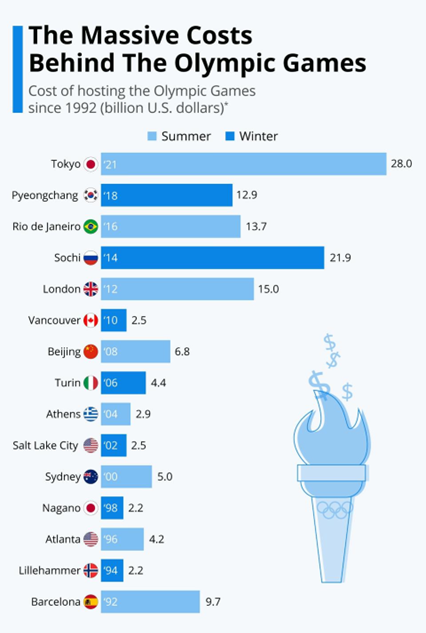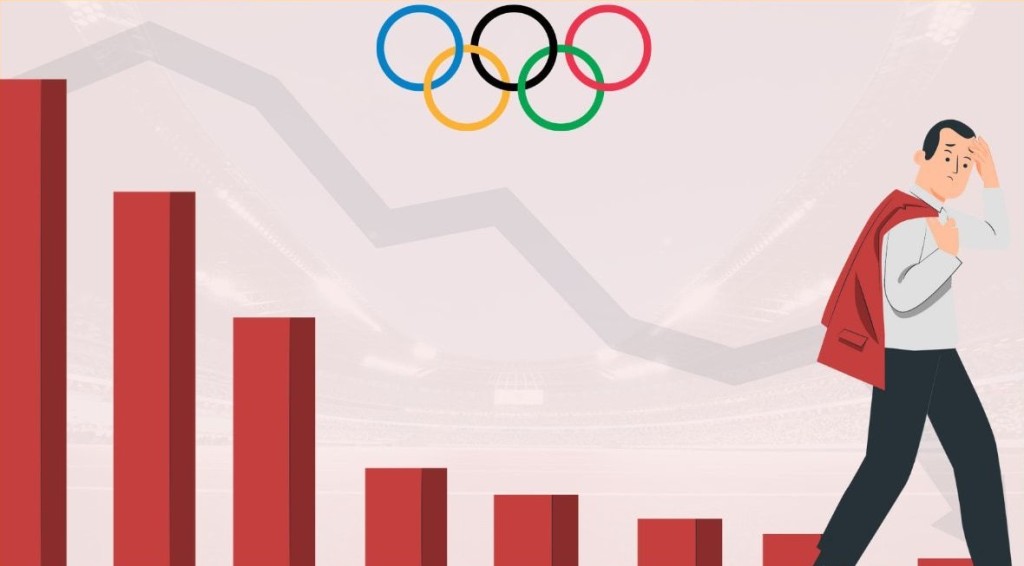Economics of the Olympics
- Shraddhanjali Sahoo

- Sep 2, 2024
- 5 min read
Updated: May 21, 2025
The Olympics are much more than a global sporting spectacle—they are a high-stakes financial gamble for host cities, with immense infrastructure demands and the potential for both economic boosts or pitfalls. Balancing the promise of economic gains or losses from hosting the Games is a complex challenge. So, what does it truly take to pull off this monumental event? Let’s explore the economic dynamics behind the Olympics, with insights from Paris 2024 and previous games.
The Heavy Price of Hosting
Hosting the Olympics is a financial rollercoaster, with budgets often spiralling far beyond initial estimates due to massive infrastructure and operational demands. Take Paris 2024, for instance: what started as a $4.5 billion budget ballooned to over $8 billion, fuelled by investments in new venues like the Aquatics Centre and the Grand Palais Éphémère, used for indoor events, alongside upgrades to existing sites. Tokyo 2020 saw an even more dramatic overrun, with final costs soaring to $15.4 billion—thanks in part to a $2.8 billion hit from the COVID-19 postponement. While these expenses are often defended as long-term investments, the reality is far more complex.

Immediate Economic Gains
The International Olympic Committee (IOC) estimated that Paris 2024 would contribute approximately $18.3 billion to the French economy, with positive effects extending across the Eurozone. This estimate includes significant tourism revenue from the expected 11 million visitors, increased infrastructure investments, and the creation of tens of thousands of jobs. However, the real impact will depend on Paris’s ability to manage costs and ensure long-term utilization of its Olympic venues.
Hosting the Olympics can give a thrilling boost to the local economy, at least in the short term. Here’s a glimpse into how it plays out:
Tourism Surge
Paris 2024 rolled out the red carpet for over 11 million visitors, drawing an impressive influx of tourists from around the globe and generating an estimated $4.2 billion in tourism revenue. The city’s vibrant atmosphere was electrified by the Games, with local hotels, restaurants, and attractions experiencing a significant boost in business.
Job Creation
This year’s Olympics created jobs around a diverse range of sectors, offering a substantial, albeit temporary, boost to the local job market. The massive scale of the Games necessitated a wide array of employment opportunities from construction workers to security. This employment surge provided a significant financial lift to many Parisians and contributed to the overall vitality of the local economy during the lead-up to and duration of the Games.
These benefits, while substantial, are often offset by the costs of hosting.
Legacy of Olympic Infrastructure
One of the primary justifications for the high costs of the Olympics is the lasting infrastructure legacy:
Sustainable Development
The Paris Olympics made a green statement by using 75% existing or temporary venues. This green approach extended beyond the event itself, as the Olympic Village is planned to be transformed into eco-friendly housing after the Games. This initiative not only addresses the immediate needs of the event but also aligns with Paris’s long-term vision for urban development, ensuring that the infrastructure serves the community for years to come.
Venue Repurposing
Paris has ambitious plans to repurpose many of its Olympic venues into public spaces, such as parks and community centres, ensuring they remain vibrant parts of the city long after the Games. This strategy is designed to avoid the "white elephant" syndrome that has plagued previous host cities, where costly facilities often fell into disuse. By transforming these sites, Paris aims to create lasting value for its residents, turning what could have been short-lived investments into enduring assets.
However, not all cities have managed to turn their Olympic investments into long-term assets.
The Financial Gamble
While the potential for economic gain is enticing, the risks are equally daunting
Cost Overruns
Montreal 1976 serves as a cautionary tale in Olympic history. The costs quickly spiralled out of control. The city found itself saddled with a staggering $1.5 billion debt, a burden that would take 30 long years to finally repay. This financial strain hung over Montreal for decades, overshadowing the legacy of the Games. The experience remains a stark reminder of the potential risks involved in hosting such a massive global event.
Post Games Debt
Rio 2016 is a vivid example of how the Olympics can strain a host city’s finances, especially in a country already grappling with economic challenges. Brazil, a nation struggling with poverty and underdevelopment, saw the Games as an opportunity to showcase its potential on the global stage. However, the reality turned out to be much more challenging. The event was plagued by significant cost overruns. Many of the newly built venues quickly became underutilized, adding to the financial burden. This mismanagement only deepened Brazil’s existing economic woes, leaving a legacy of debt.
These examples highlight the potential financial pitfalls of hosting the Olympics.

Uneven Economic Impact
The economic benefits of hosting the Olympics often come with an uneven distribution, creating clear winners and losers:
Winners
Construction and Real Estate:
Companies involved in building Olympic infrastructure often rake in substantial profits. In this year’s Olympics, for example, major French firms like Vinci and Bouygues secured lucrative contracts, thriving on the extensive construction boom driven by the Games.
Hospitality and Retail:
These sectors experience a surge in business during the Olympics. Hotels, restaurants, and shops enjoy a spike in sales, capitalizing on the influx of tourists eager to experience the city.
Losers
Local Residents:
These are the people who bear the brunt of displacement and rising living costs due to Olympic developments. In Rio 2016, thousands were forced from their homes to make way for Olympic infrastructure, sparking widespread criticism and protests.
Small Businesses:
These struggle to compete with large corporations that dominate Olympic commerce. While big retailers have thrived in past Olympics, many small businesses near the venues reported disappointing sales, hindered by restrictions and competition from major brands.
This uneven distribution of benefits raises critical questions about who truly gains from hosting the Olympics. Are the games just making the rich even richer or are the economic sacrifices towards the locals and small businesses justified in the name of economic growth?
Is Hosting the Olympics Worth the Gamble?
In conclusion, the economics of hosting the Olympics is a complex economic challenge, with significant risks as well as potential rewards. While the promise of economic boosts, such as increased tourism revenue and job creation, can be enticing, the reality often involves navigating cost overruns and managing underutilized facilities. The case studies of past Games—from the grandeur of Paris 2024 to the financial struggles of Athens 2004—highlight both the opportunities and challenges that come with being an Olympic host. Ultimately, the success of hosting the Games hinges on striking a balance between immediate economic benefits and long-term sustainability, ensuring that the legacy of the Olympics is positive and enduring for the host city and its residents. We’ve examined the economic impacts of recent Olympic Games, now, what’s your take—do the potential economic rewards of hosting the Olympics justify the risks?
-Shraddhanjali Sahoo



Comments